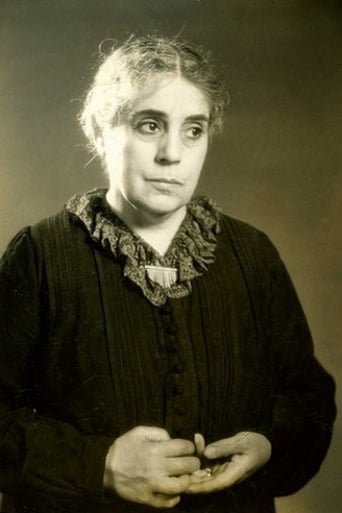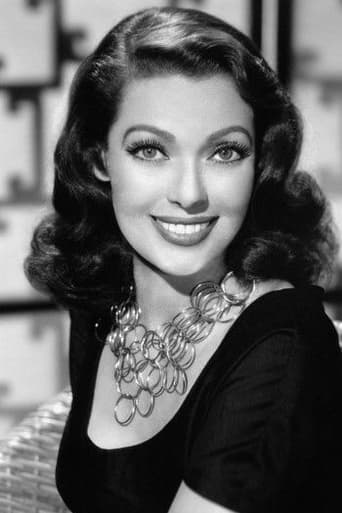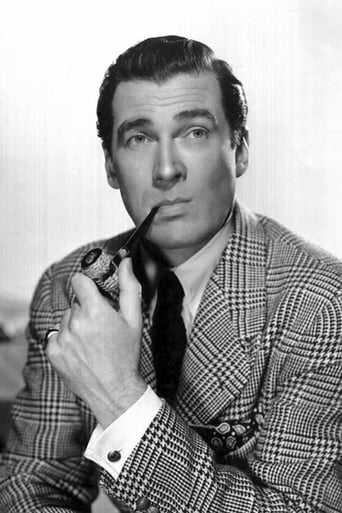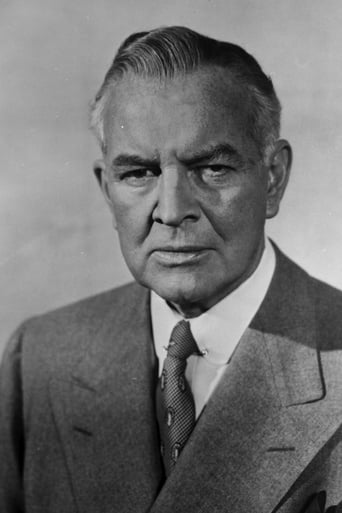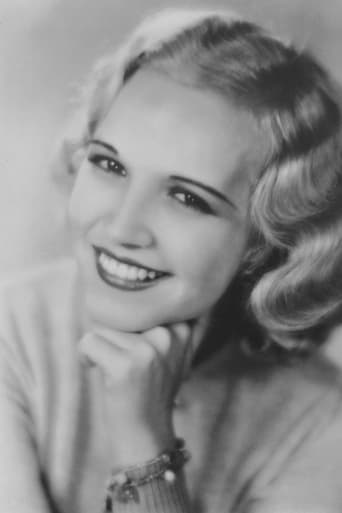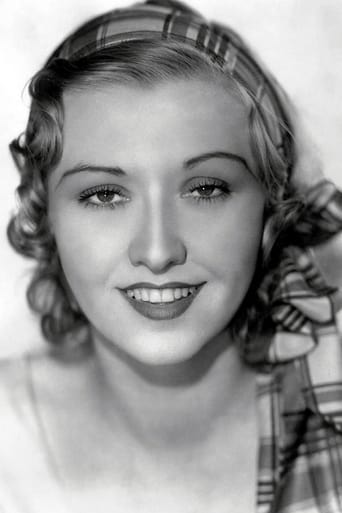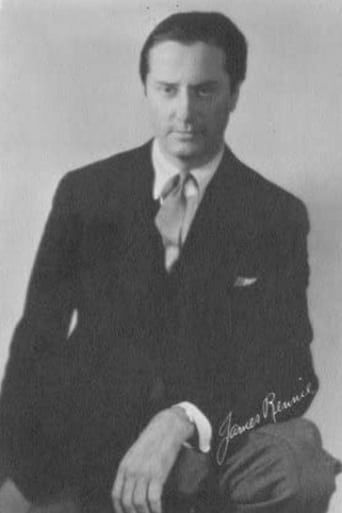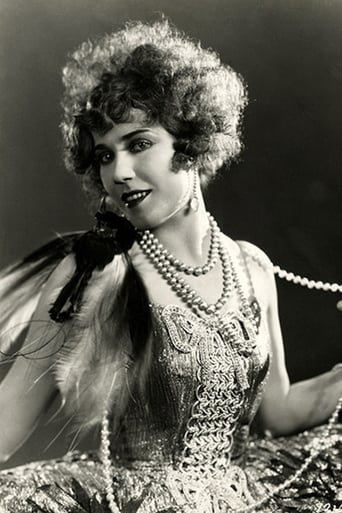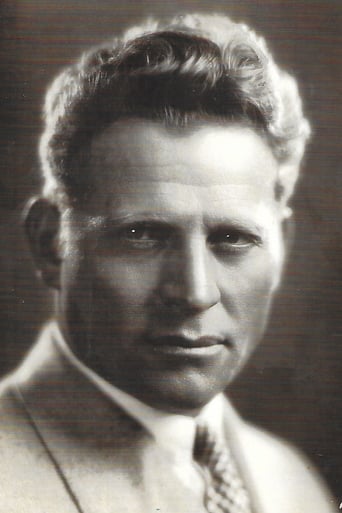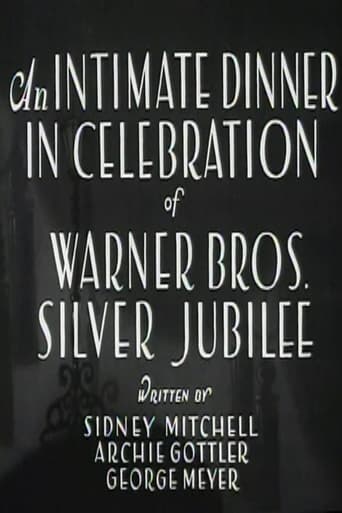
Mr. and Mrs. Warner Bros. Pictures and their precocious offspring, Little Miss Vitaphone, host a dinner in honor of Warner Bros. Silver Jubilee, attended by most of the major players and song writers under contract to WB at that time.
Reviews
So much average
How sad is this?
Excellent, Without a doubt!!
I cannot think of one single thing that I would change about this film. The acting is incomparable, the directing deft, and the writing poignantly brilliant.
Warner's Intimate Dinner is a historic curio indeed. The phony Mr. and Mrs. Warner Brothers Pictures yields to baby Vitaphone, who then proceeds to provide publicity to each actor and actress seated at the dinner table. Little miss Vitaphone introduces them one by one or in pairs as they appeared in their own or each other's films at the time. A high majority of the "stars" at the celebration weren't really stars at all but were just starting their film careers or had only a few movies under their belts at the time. This includes even Edward G. Robinson, who is referred to without the "G" here. Many of those present worked only a few years in films before flaming out, including the director of this piece. An unexpected but pleasant surprise is seeing the several composers appear who weren't really tied to Warner Brothers, so one can only wonder why they made appearances here. Due to to the talent involved, or in some cases, the lack of it, it seems as if this film is simply a shameless excuse to promote new talent for Warner Brothers, especially considering the fact this was no where near Warner's 25th anniversary.
This 1930 short proclaimed to be Warner's Silver Jubilee (25 years-old, and going strong.) And, indeed, it was. The brothers entered the business in 1906, as theatre exhibitors in a converted store in New Castle, Pa. Okay, close enough. They begun making films in 1912, but their first full-blown movie, "My Four Years in Germany", appeared in 1918. They acquired the 40-acre Beesmyer Ranch, on Sunset Boulevard, in 1919.Their filing of the certificate of incorporation in Delaware on April 4, 1923 (remember this date)signified the legal birth of the company. They acquired the Vitagraph Studio in Brooklyn in 1925, and First National in 1927. (Those who are fond of sticking Vitagraph, Vitaphone and First National on all Warner Bros. films might want to remember the 1925 and 1927 dates.) And, then, 43 years after their 25th birthday party in 1930 ( listed on this page and can be seen on TCM from time-to-time), Warners tossed themselves a 50th Birthday Anniversary, which, according to most math standards, actually occurred in their 67th year.Hocus-Pocus and right before our eyes, Warners de-aged themselves seventeen years. And set a bad precedent in doing so, as the current generation in the industry thinks such matters as public records should not be made public and thereby keep them from getting calls to play teen-agers when they are pushing 35.At least, Warners had 1923 as their incorporation birth-year to back up their claim of only being fifty in 1973. That might be the solution for actors to want to shave years...get incorporated...and then you can play teen-agers when you are only two-or-three years old or, at the worst, get turned down for being too young.
I'm giving this short subject a few points more than it deserves, because there are some faces in it that one rarely if ever saw or heard in early talkies. Among them are Broadway stars Otis Skinner (see OUR HEARTS WERE YOUNG AND GAY and KISMET), and Marilyn Miller, as well as young Richard Rodgers, Lorenz Hart, Sigmund Romberg, Oscar Hammerstein II, Al Dubin, and such faces as Walter Huston, Frank McHugh, Joan Blondell, Edward G. Robinson, Walter Pidgeon, Loretta Young, Sidney Blackmer, and Ona Munson. I can even add the Fred Kohler Sr. and Beryl Mercer. It's pleasant seeing faces of some importance or still vibrant memory there.But having said that I look at the bulk of the celebrities. The chief spokesperson is a young girl, Betty Jane Graham, as "Little Miss Vitaphone". Vitaphone, of course, was the process that the Warners used to bring talkies to Hollywood. Ms Graham is polite and well spoken. She is a pretty child. That said, there has absolutely no spark of talent or panache in her. If you check the thread on her, she had a career into the 1940s, but increasingly it fell into not even supporting parts but extras. Finally she must have gotten the message and left films entirely.I have heard of Evelyn Knapp (barely) and Louis Fazenda, but who on earth are Leon Janney (any relation to television star Alison Janney?), Claudia Dell, or James Rennie? The stars of tomorrow. Their credits barely suggest anything.In the other comments on this thread, there are complaints that the brothers Warner failed to use such figures as George Arliss, Richard Barthelmess, or (my God, how could they?!) John Barrymore. Yes, indeed, they did. They also did not bring in their champion man of song Mr. Al Jolson. A song is sung at the end by some well intentioned crooner with a forgettable name, who looks like he's got a great future in half-empty concert halls. He is warbling a slightly passable ditty with words by Mr. Dubin. As I listened to him sing this, and saw Ms Miller was in that room, I wanted to cry. The tune is not a standard, but with a bit of friendly or sexy push it might have been. Or if Mr. Jolson had been around it might have been.I take it this was done as publicity (to show off some of the big and so-called promising names) for the studio. As such they may have grabbed whoever was available (due to shooting schedules) on that day or two it was shot. So, as a museum piece it is curious enough to merit a "7" out of generosity to Otis and Marilyn in particular. But otherwise I felt like a lot of good film stock was wasted in this work.
I am not a huge fan of short films from the 20s and 30s unless they are comedies. However, when I saw this on TCM, I still watched it because I was excited about seeing a film that was essentially a commercial extolling the wonders of Warner Brothers. That's because I wanted to see their stars and see how they looked when they were young. Well, unfortunately, I noticed that in 1930, they had very few stars anyone would recognize today. I am really good at film trivia and there were several I simply didn't recognize and many who I did recognize but knew them only as small-time actors. Plus, three of their biggest stars weren't in this short and they simply showed photos of them and inserted fake letters from them to the audience. Not having John Barrymore, George Arliss and Richard Barthelmess was a real disappointment and the audience had to be content to watch a few small-time actors (with the exceptions of Loretta Young, Walter Huston and a couple lesser stars, who were in the film). The film's structure was also something I myself didn't like--having the film star a small child called "Miss Vitaphone". Yes, I understood the significance--Vitaphone was the new unit from Warners responsible for sound pictures. But, I'm not much of a fan of precocious children.All-in-all, this is a curio and that is all--and not a very interesting one at that.
Top Streaming Movies













